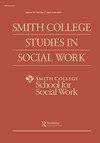Laughter Yoga as a Social Work Intervention
IF 0.9
Q2 SOCIAL WORK
引用次数: 2
Abstract
ABSTRACT Using simulated laughter, clients follow laughing patterns without using memory recalls or associating with any thinking or feeling. This practice update describes laughter yoga as a social work intervention. It demonstrates the functions, principles, and procedures of laughter yoga to help clients alleviate stress and at the same time enable social workers to practice with the clients as a self-care exercise during an emotionally intensive session. A composite case is used to demonstrate how the social worker used laughter yoga as an exercise with Mrs. X, a patient with cancer. The outcomes, in this case, are used to show the method and its procedures rather than evaluating efficacy. It suggests that social workers may benefit from utilizing laughter yoga as an intervention. Future research should address its effectiveness by measuring beta-endorphin increases for relaxation and improvement in social bonding.笑声瑜伽作为一种社会工作干预
摘要使用模拟笑,客户在不使用记忆回忆或任何思维或感觉的情况下遵循笑模式。此练习更新将大笑瑜伽描述为一种社会工作干预。它展示了笑瑜伽的功能、原则和程序,以帮助客户缓解压力,同时使社会工作者能够在情绪密集的课程中与客户一起练习自我护理。一个综合案例被用来演示这位社会工作者如何与癌症患者X夫人一起使用大笑瑜伽作为练习。在这种情况下,结果用于显示方法及其程序,而不是评估疗效。研究表明,社会工作者可能会从使用大笑瑜伽作为干预措施中受益。未来的研究应该通过测量β-内啡肽的增加来解决其有效性,以放松和改善社交关系。
本文章由计算机程序翻译,如有差异,请以英文原文为准。
求助全文
约1分钟内获得全文
求助全文
来源期刊

SMITH COLLEGE STUDIES IN SOCIAL WORK
SOCIAL WORK-
CiteScore
1.50
自引率
10.00%
发文量
10
期刊介绍:
Smith College Studies in Social Work focuses on the vital issues facing practitioners today, featuring only those articles that advance theoretical understanding of psychological and social functioning, present clinically relevant research findings, and promote excellence in clinical practice. This refereed journal addresses issues of mental health, therapeutic process, trauma and recovery, psychopathology, racial and cultural diversity, culturally responsive clinical practice, intersubjectivity, the influence of postmodern theory on clinical practice, community based practice, and clinical services for specific populations of psychologically and socially vulnerable clients.
 求助内容:
求助内容: 应助结果提醒方式:
应助结果提醒方式:


